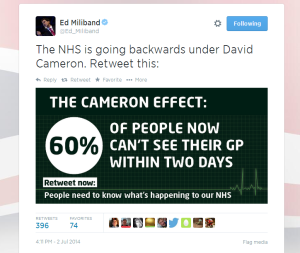Surveys don't show that 60% 'can't' see their GP within two days
"The Cameron Effect: 60% of people now can't see their GP within two days" - Ed Miliband tweet
Access to NHS services in England has been the subject of much debate over the past few days. We've covered claims about waiting lists, and others have looked at claims about waiting times in accident and emergency departments. Today we're looking at how long people have to wait to see their GP.
A survey published last year found that 60.5% of respondents had waited for more than 48 hours for a GP appointment. But the survey wasn't sent to a random sample of people, meaning that the extent to which its findings are representative of patients more generally is unclear.
This month's GP patient survey, which is based on a random sample, found that about 42% of respondents saw or spoke to someone at their GP surgery within two working days last time they tried to get an appointment. About 5% of patients couldn't remember if they had or not.
Join 72,953 people who trust us to check the facts
Sign up to get weekly updates on politics, immigration, health and more.
Subscribe to weekly email newsletters from Full Fact for updates on politics, immigration, health and more. Our fact checks are free to read but not to produce, so you will also get occasional emails about fundraising and other ways you can help. You can unsubscribe at any time. For more information about how we use your data see our Privacy Policy.
Neither survey tells us much about how many people can't see their GP within that time frame - some of the respondents who waited longer for an appointment might have been quite happy to do so.
60% figure not representative of patients
In 2012-13, the Patients Association sent out three surveys to its members and online supporters. It also advertised them using social media. That means that we've no way of knowing how closely this group of people resemble NHS patients generally - for example it might be that supporters of the Patients Association are more or less likely than the average person to have had to wait longer than 48 hours for an appointment.
Of 1,453 respondents, 40% said they got an appointment with their GP within 48 hours. 31% had an appointment within a week, 20% within a fortnight, and 7% within a month. There's no evidence the responses were weighted to be representative of the population of patients as a whole.
We don't know how many of the 60% who didn't see their GP within 48 hours actually wanted to do so.
About 42% of respondents to the GP patient survey had spoken to someone within two working days
NHS England publishes a yearly survey of randomly selected GP patients. This year about 2.6 million patients were sent surveys, of which 900,000 responded. Their responses were 'weighted' according to demographics so that they were representative of patients. The researchers provide a good example of why this is important:
For example: what if one GP surgery has many more 18 to 24-year-old patients than 75 to 84-year-olds, but only a small number of 18 to 24-year-olds actually fill out the survey? By applying more weight to the responses from 18 to 24-year-olds, the results for a practice will more accurately reflect the views of the practice population.
86% of respondents were able to see or speak to someone at the surgery last time they tried. Of these, 49% said they saw or spoke to someone on the same day, or on the next working day. So that's about 42% of patients. Of course, if they were calling on a Friday that would mean a wait of over 48 hours.
There were a further 3% of respondents who couldn't remember if they had been able to speak to someone, and 2% who had but couldn't remember how long it had taken them. So 5% in total couldn't provide information on whether they had spoken to someone within two working days.
As with the Patients Association survey, we don't know how many of the remaining patients - about 53% of them in this case - were unable to get speak to someone within two working days and how many of them were happy with the situation. The survey did find that of those able to speak to someone within any time period, 92% described it as "convenient".
This article originally said that 49% of all people surveyed in the GP patient survey had got an appointment within two working days. This was based on the summary report. The results tables make clear that this is actually the proportion of those who got an appointment or otherwise spoke to someone, not all patients, so that section of the article has been corrected. The tables also contain information on the proportion saying they can't remember details of their last appointment, which we've now included.